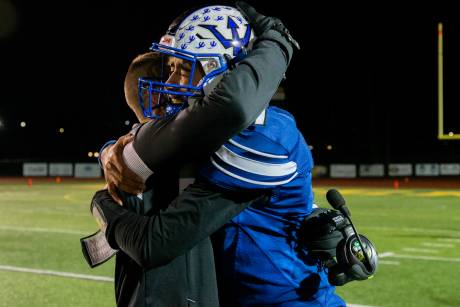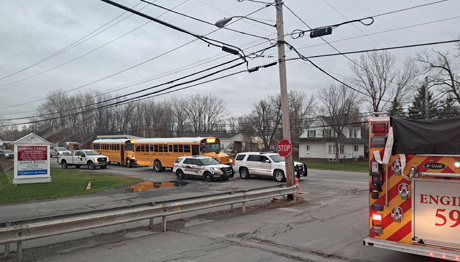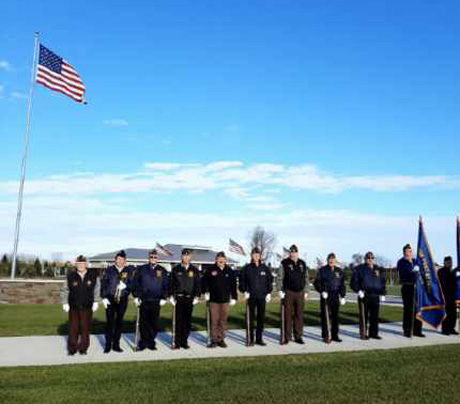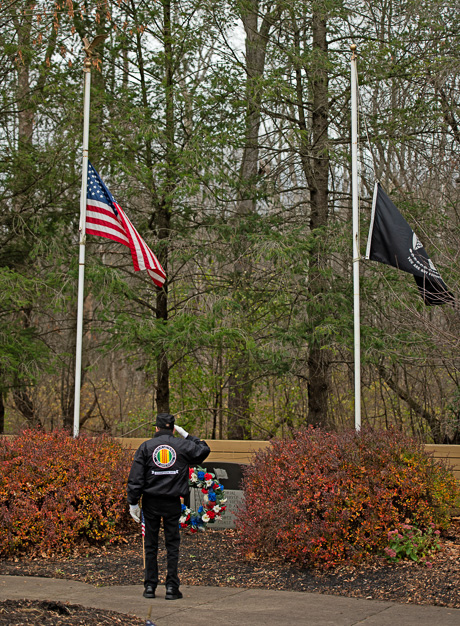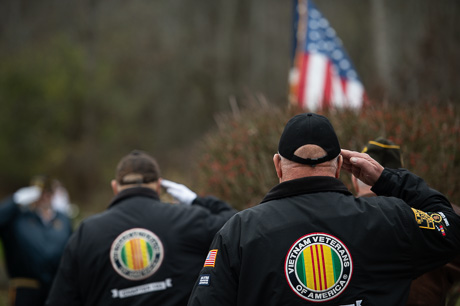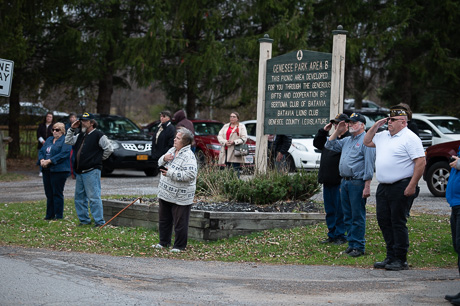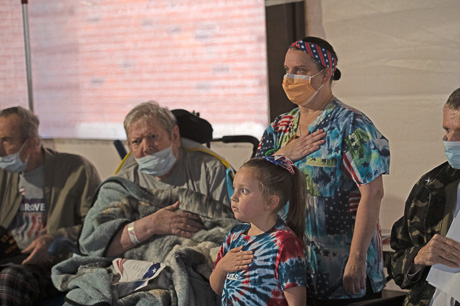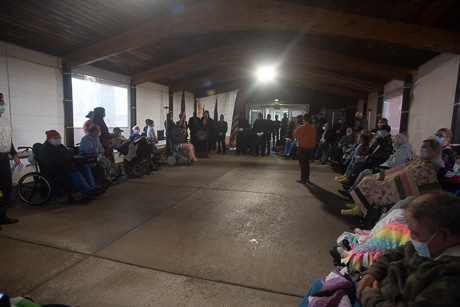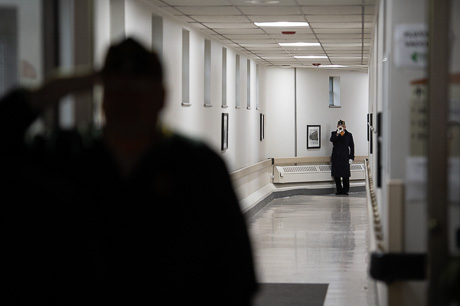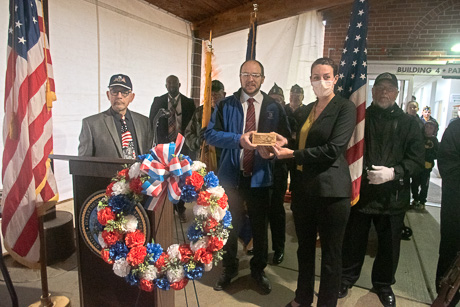Artist and Batavia native Anthony Terrell was amongst friends and family during a showing of his paintings Thursday at Haxton Memorial Library.
Not just any paintings, this collection of six pastel-hued works was in memory of his sister Onnalee Berrios. “Amethyst Clouds Over Oakfield” was an appropriate title for each piece washed in shades of purples, pinks and blues.
The evening was about remembering Onnie, as he called her, and reconnecting family members, fellow artists, friends, and the Blue Devils' “60s Girls,” made up of 1960 Batavia High School graduates, which included Terrell’s sister Veronica.
Living in New York City, Terrell gets asked why he likes to come here to visit. Because people "people treat me nice," he said.
He would have been remiss not to make special note of one of those people who made an impact on his career, he said. His former high school art teacher Mary Tyler certainly deserves credit for her kind critiques.
Early on, she looked at Terrell's artwork and told him that he had a gift to pursue.
“It wasn’t good,” he said. “But she told me that, and I thought I was Picasso.
“And I gotta tell you, she was absolutely instrumental to where I am now. You know the work when you're that young, and you're trying to be an artist, you're generally copying Picasso, Modigliani, Monet, all the famous artists, you're trying to capture what they've done,” he said. “I wasn't capturing it, but she kept encouraging me, because, she said, ‘I think you have talent. I think you should stick to it.’ And those are the days that I was using old cans of house paint, and Red Devil paints that we used to paint our bicycles with, anything that we could get our hands on. And every time I give a talk about my artwork, I thank her because it was because of her.”
Tyler's influence still runs strongly through him, now as an accomplished NYC artist with Sphinx Works. As life goes, he discovered the "it's a small world" element in Batavia, by meeting someone who lives in Tyler's former home, and taking a tour while reminiscing about his late teacher. Her backyard was filled with all sorts of botanicals in gardens that seemed fitting for an art lover. She mentored him through encouraging words, he said.
"Yeah, she took a liking to me. There were only three black students in the school. Me, my sister and Rick Thomas, who still lives in Batavia," Terrell said. " At the time, the Beatles just got started making it big in '63, and then the Rolling Stones and the Kinks ... Nixon had come in at '68, right after I graduated, but Kennedy really made a big difference. So the economy started getting a boost, because there's always a sense of promise, you know, from when Kennedy made his speech to Martin Luther King was coming, and so forth."
Being in only one of three African American families wasn't always easy, he said. At one point, his parents wanted to buy a particular home in the city, but Batavia was "very conservative, and it was not pro-African Americans at all," he said.
"The neighbors, our neighbors, put up a petition saying that 'tell the owner that the neighborhood did not want blacks living in their neighborhood,' even though we were well respected. And we were forced to get a house when we looked and looked and looked, and looked again," he said. "But when they see your color, even Batavia ... we ended up getting 14 Lehigh Avenue, which is a house that nobody wanted because it was next to the railroad tracks."
He attended Jackson Elementary at that time, and then, when in the former Junior-Senior High School on Ross Street, he wasn't considered one of the smart kids. He didn't like science and math, but teachers wanted kids to pass, so they would offer different levels of studies, Terrell said. He enrolled in shop class. and it was there that he met Mary Tyler.
"I didn't really know her, but I liked being around the easels. And it wasn't math and it wasn't science, which I never was good at in high school," he said. "I just literally fell in love with Mary Tyler. She encouraged me, so I haven't forgotten my roots."
Sounds just like his sister Onnie. His late sister was supportive, understanding, and a guiding force to help a young boy navigate through small-town ways and limited rural opportunities.
“I loved coming over to her house. And the pictures which I’m going to talk about, are a reflection of that,” he said to the group of about 25 attendees. “If you could connect with a person that would kind of keep you straight on the path, as she did, it was very beneficial to me.”
Not long after graduating from BHS in 1967, Terrell went to live in California for a few months before returning to work at Doehler-Jarvis in Batavia. In April 1969, while many of his classmates had gone on to college, which Terrell’s family couldn’t afford, he was drafted into military service. It was during the Vietnam era, and he still remembers reporting for duty on the second floor of the former Mancuso’s Theater on Main Street.
He and his fellow recruits were processed, put on a bus, issued ID “dog” tags and then sent by plane to Fort Dix, NJ. He served in the Army until May 1971, and returned to a job saved for him by Doehler. "I got a promotion," he said, going from melting down assorted metals — a hard, sweaty job — to making casts for Briggs Stratton lawnmowers and General Motors car parts. Business was booming at the time, he said, thanks to a special steering column part called a saginaw, which Doehler made for GM.
Still, it wasn't really a fulfilling job, so he eventually decided -- with some insistence from his mom -- to get out of town. He packed up for NYC in January 1972. His brother Francis was attending law school there.
"It was a very cold morning, very cold," he said. "My mother had called my brother and told him to 'get your brother a job.'"
Terrell learned his way around, taking his first subway and having “no idea where I was going.”
“I was really naive," he said. "It was really frightening for me."
He did get a job by the end of his first week and stuck it out for a year before quitting and getting another job for a dry cleaning service. He also met his wife at that first place that dealt with stocks and bonds. Gwendolyn worked in the legal department, and it must have been meant to be: they have now been married for 50 years.
She was one of the people he thanked during the reception, attributing her patience and support for his longtime success as a full-time artist.
He ran through his thank-yous, which included his mother, who brought him into the world, and Oakfield resident and former art teacher Terry Kolb, who helped to organize the reception. Terrell then reviewed each piece of his collection in memory of Onnie, who died in 2003 at age 64.
He recalled how they would sit in rocking chairs with their feet up on the porch railing, going back and forth while enjoying the time together. Each scene and related memory depicted a strong brother-sister bond.
Terrell described how some unknown inspiration prompted him to put masking tape over his initial pictures, in varying directions for an illustration board. Once knowing that, the novice observer can note how the paintings have geometric movement of lines within a sea of pastel colors.
All of it was for his beloved sister, “because I love her and I miss her,” he said.
“But she’s still in my heart,” he said.
For those that missed the debut Thursday, Terrell’s pieces will be at the library from 9 a.m. to noon Saturday.
Learn more about Onnalee Berrios HERE.
Top Photo: Batavia native Anthony Terrell, now of New York City, talks about the paintings he created for his late sister during a reception Thursday evening at Haxton Memorial Library in Oakfield. Photo above is of Terrell with Terry Kolb of Oakfield. Photos by Joanne Beck.














